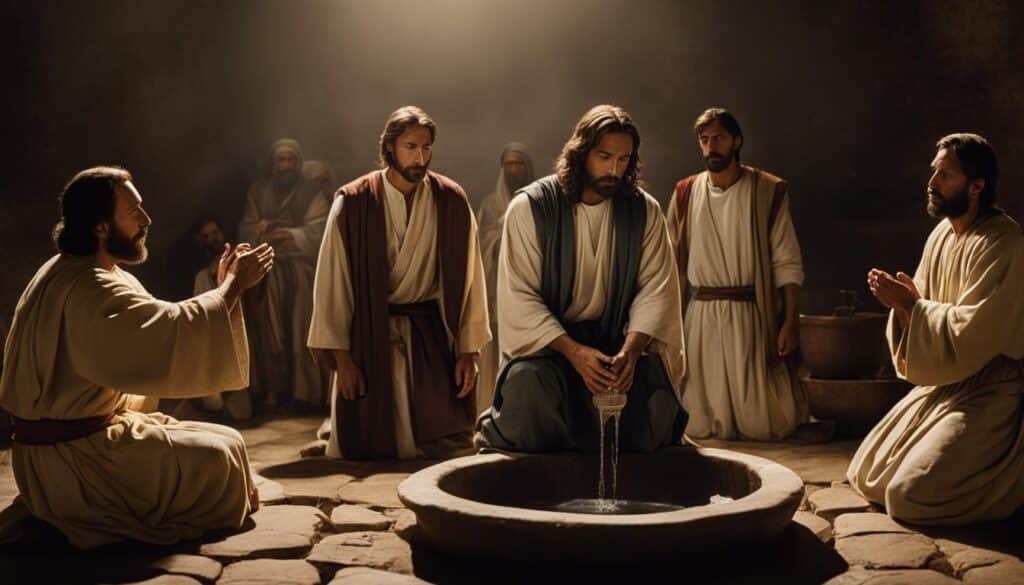
The Bible offers profound insights into leading a life graced with modesty and compassion. By studying the stories and teachings found within its pages, we can learn valuable lessons of humility that can shape our character and relationships. In this article, I will explore some of the key biblical stories that exemplify the virtues of humility and provide guidance on how to cultivate humility in our own lives.
Key Takeaways:
- Humility is a virtue emphasized in biblical stories, providing valuable lessons for leading a humble life.
- Examples of humility can be found in the stories of Moses, Jesus, Job, and in the wisdom literature of Proverbs and Psalms.
- Humility involves recognizing our limitations, submitting to God’s authority, serving others, and trusting in His wisdom.
- Through humility, we can cultivate compassion, wisdom, and grace in our interactions with others.
- By applying the lessons of humility from biblical stories, we can strive to lead a life marked by humility and grace.
The Humility of Moses
One exemplary story of humility in the Bible is that of Moses. When God called Moses to lead the Israelites out of slavery in Egypt, Moses initially doubted his own abilities and felt unworthy of the task. However, through the encounter with the burning bush, God reassured Moses and encouraged him to trust in His guidance.
Moses submitted to God’s authority and served as a leader for the Israelites with humility, relying on God’s strength rather than his own. This story teaches us the importance of recognizing our limitations, relying on God’s power, and leading with humility.
“Who am I that I should go to Pharaoh and bring the Israelites out of Egypt?” – Moses (Exodus 3:11)
Moses’s humility is evident when he questions his own worthiness and ability to fulfill the task given to him. Despite his self-doubt, he trusted in God and followed His instructions, displaying true leadership through humility.
Leading by Example
Moses’s humility extended beyond his initial reluctance. Throughout his leadership journey, he continuously sought God’s guidance and relied on Him for strength and wisdom. He did not put himself above the Israelites but served them with a humble heart.
Moses’s humility is not only demonstrated through his interaction with God but also in his interactions with the people he led. He constantly interceded on behalf of the Israelites, even when they rebelled against him. Despite the challenges he faced, Moses remained steadfast in his commitment to serving God and the Israelites with humility.
Moses was very humble, more so than anyone else on the face of the earth. – Numbers 12:3
These qualities of humility and reliance on God’s strength distinguished Moses as a remarkable leader and exemplify the power of leading with humility.
https://www.youtube.com/watch?v=pUnTgcshGQ0
The encounter between Moses and the burning bush symbolizes the transformative power of humility. It serves as a reminder that true leadership stems from recognizing our own limitations and surrendering to God’s guidance.
The Humility of Jesus
Jesus is the ultimate example of humility in the Bible. His life and teachings emphasize the importance of humility, putting others before ourselves, and living a life of sacrificial love. One significant event that highlights His humility is the washing of the disciples’ feet.
In a culture where foot-washing was typically done by a servant, Jesus, who was their teacher and Lord, took on the role of a servant and humbly washed the feet of His disciples. This act symbolizes Jesus’ selfless love and willingness to serve others. It demonstrates that true leadership comes not from a position of power, but from a posture of humility and servant leadership.

This powerful image captures the essence of Jesus’ humility and servant heart. It serves as a visual reminder of the profound impact that humility can have in our lives and relationships. Just as Jesus served His disciples, we are called to serve others with humility and compassion, putting their needs above our own.
“Just as the Son of Man did not come to be served, but to serve, and to give his life as a ransom for many.” – Matthew 20:28
Jesus’ act of washing the disciples’ feet challenges societal norms and calls us to a higher standard of servant leadership. It teaches us that true greatness is not measured by status or power, but by our willingness to humble ourselves and serve others.
Lessons from Jesus’ Humility
- Put others before yourself: Jesus demonstrated the importance of prioritizing the needs of others. By following His example, we can cultivate empathy and compassion, fostering stronger relationships and fostering a more inclusive and caring community.
- Embrace servant leadership: Jesus exemplified the essence of servant leadership. By leading with humility and putting the well-being of others first, we can inspire and empower those around us to reach their full potential.
- Cultivate a humble heart: Humility requires recognizing our own limitations and acknowledging that we are not the center of the universe. By cultivating a humble heart, we open ourselves up to learning, growth, and the wisdom that comes from recognizing our dependence on God.
| Key Lessons from the Humility of Jesus |
|---|
| Put others before yourself |
| Embrace servant leadership |
| Cultivate a humble heart |
Humility in Adversity: Job’s Story
The story of Job is a powerful testament to the virtue of humility in the face of adversity. Job, a prosperous and righteous man, faced unimaginable trials when he lost his wealth, his health, and even his family. Despite his suffering, Job remained humble and unwavering in his trust in God.
Job’s humility is evident in his response to his hardships. Instead of questioning or resenting God, he acknowledged his own limitations and surrendered to God’s sovereignty. In the midst of his pain, Job declared, “Naked I came from my mother’s womb, and naked I will depart. The Lord gave and the Lord has taken away; may the name of the Lord be praised” (Job 1:21, NIV).
Job’s humility extended to his willingness to listen and learn from God. When confronted by God Himself, Job recognized his limited understanding and repented in dust and ashes. He said, “I am unworthy—how can I reply to you? I put my hand over my mouth. I spoke once, but I have no answer—twice, but I will say no more” (Job 40:4-5, NIV).
Throughout his suffering, Job’s humility allowed him to trust in God’s wisdom and plan, even when he couldn’t comprehend the reasons behind his trials. He recognized that his perspective was limited compared to the divine knowledge and power of God.
The story of Job serves as a profound example of humility in adversity. It teaches us to remain humble in the face of affliction, to trust in God’s greater purpose, and to submit to His sovereignty. Job’s story reminds us that humility is not the absence of confidence or strength, but rather the acknowledgment of our dependence on God and our willingness to surrender to His will.
Key Lessons from Job’s Story:
- Humility allows us to trust in God’s wisdom and plan, even in the midst of incomprehensible suffering.
- Being humble doesn’t mean losing confidence or strength; it means recognizing our limitations and relying on God’s strength.
- Humility involves surrendering to God’s sovereignty and submitting to His will, even when it may seem difficult or unfair.
“Though He slay me, yet will I trust in Him,” (Job 13:15, KJV).
Lessons of Humility from Proverbs and Psalms
The books of Proverbs and Psalms in the Bible offer a wealth of wisdom literature that provides valuable insights into humility. Proverbs, in particular, emphasizes the importance of humility as a virtue that leads to wisdom and honor. It encourages us to seek humility, listen to wise counsel, and cultivate a humble heart in our interactions with others.
“When pride comes, then comes disgrace, but with humility comes wisdom.” – Proverbs 11:2
Proverbs teaches us that embracing humility allows us to gain deeper insights and make wiser decisions. It reminds us that humility opens the door to true wisdom and honor, while pride only brings disgrace. By seeking humility, we can navigate our lives with greater wisdom and humility in our actions.
The Psalms, on the other hand, contain numerous expressions of humility. The psalmists often acknowledge their dependence on God and express their willingness to submit to His will. These heartfelt reflections remind us of the transformative power of humility and the importance of recognizing our reliance on a higher power.
“The sacrifices of God are a broken spirit; a broken and contrite heart, O God, you will not despise.” – Psalm 51:17
In Psalms, the humble heart is valued above sacrifice. It teaches us that true worship of God comes from a broken and contrite heart, one that recognizes its own weaknesses and seeks God’s guidance and forgiveness.
Through the lessons of humility found in Proverbs and Psalms, we are reminded of the transformative power of humility in our lives. These wisdom literature guide us towards a humble mindset, enabling us to cultivate wisdom, honor, and a deeper connection with God.
Seeking Humility in Proverbs and Psalms
In Proverbs and Psalms, we find practical advice on seeking humility:
- Listen to Wise Counsel: Proverbs encourages us to listen to those with wisdom and understanding, recognizing that we can gain valuable insights from others.
- Cultivate a Humble Heart: Both Proverbs and Psalms emphasize the importance of humility in our interactions with others. They remind us to approach relationships with a humble and compassionate attitude.
- Submit to God’s Will: The Psalms teach us to surrender ourselves to God’s authority, acknowledging His wisdom and guidance in our lives.
Finding Strength in Humility
The wisdom literature of Proverbs and Psalms teach us that humility is a source of strength. By embracing humility, we open ourselves up to greater wisdom, honor, and a deeper connection with God. Seeking humility allows us to live a life marked by compassion, understanding, and a genuine desire to serve others.

| Lessons of Humility | Key Teachings |
|---|---|
| Humility leads to wisdom and honor. | Proverbs 11:2 |
| True worship comes from a humble heart. | Psalm 51:17 |
| Listen to wise counsel. | Proverbs |
| Cultivate a humble heart in interactions with others. | Proverbs and Psalms |
| Submit to God’s will. | Psalms |
Conclusion
The lessons of humility from the Bible are timeless and hold the power to shape our character and relationships. By exploring the stories of Moses, Jesus, Job, and contemplating the wisdom literature found in Proverbs and Psalms, we gain valuable insights into leading a life marked by humility and compassion.
Living a humble life entails recognizing our limitations and submitting to God’s authority. It involves serving others selflessly and trusting in His wisdom, even during times of adversity. The examples set by Moses, who embraced his role as a humble leader with unwavering reliance on God, and Jesus, whose act of washing His disciples’ feet symbolized the essence of servant leadership, inspire us to embody the virtues of humility in our own lives.
As we internalize these lessons and apply them in our daily interactions, we experience the transformative power of humility. It enables us to develop deeper connections with those around us and fosters an environment of kindness and understanding. By living a life of humility and grace, we create a positive impact on our surroundings and embody the teachings of the Bible.
FAQ
What are some key lessons of humility that we can learn from biblical stories?
The Bible offers profound insights into leading a life graced with modesty and compassion. By studying the stories and teachings found within its pages, we can learn valuable lessons of humility that can shape our character and relationships.
How does the story of Moses exemplify humility?
One exemplary story of humility in the Bible is that of Moses. When God called Moses to lead the Israelites out of slavery in Egypt, Moses initially doubted his own abilities and felt unworthy of the task. However, through the encounter with the burning bush, God reassured Moses and encouraged him to trust in His guidance. Moses submitted to God’s authority and served as a leader for the Israelites with humility, relying on God’s strength rather than his own.
What is the significance of Jesus washing the disciples’ feet in relation to humility?
Jesus is the ultimate example of humility in the Bible. One significant event that highlights His humility is the washing of the disciples’ feet. In a culture where foot-washing was typically done by a servant, Jesus, who was their teacher and Lord, took on the role of a servant and humbly washed the feet of His disciples. This act symbolizes Jesus’ selfless love and willingness to serve others. His life and teachings emphasize the importance of humility, putting others before ourselves, and living a life of sacrificial love.
How does the story of Job teach us about humility?
The story of Job teaches us about humility in the face of adversity. Despite experiencing immense suffering and loss, Job remained humble and steadfast in his trust in God. He acknowledged his own limitations and submitted to God’s sovereignty, even when he didn’t understand the reasons behind his suffering. Job’s story reminds us to maintain humility in times of hardship and to trust in God’s wisdom and plan, even when it may seem difficult or unfair.
What lessons of humility can we learn from Proverbs and Psalms?
The books of Proverbs and Psalms in the Bible contain valuable teachings and reflections on humility. Proverbs emphasizes the importance of humility as a virtue that leads to wisdom and honor. It encourages us to seek humility, to listen to wise counsel, and to cultivate a humble heart in our interactions with others. The Psalms contain numerous expressions of humility, as the psalmists acknowledge their dependence on God and express their willingness to submit to His will. These wisdom literature remind us of the transformative power of humility in our lives.








